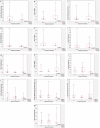Gut microbial predictors of first-line immunotherapy efficacy in advanced NSCLC patients
- PMID: 39979394
- PMCID: PMC11842579
- DOI: 10.1038/s41598-025-89406-1
Gut microbial predictors of first-line immunotherapy efficacy in advanced NSCLC patients
Abstract
The composition of the gut microbiome of patients with advanced non-small cell lung cancer is currently considered a factor influencing the effectiveness of treatment with immune checkpoint inhibitors. We aimed to evaluate the baseline gut microbiome composition in patients before receiving first-line immunotherapy alone or combined with chemoimmunotherapy. We performed 16S rRNA sequencing based on hypervariable regions. Stool samples were collected from 52 patients with advanced NSCLC treated with immunotherapy or chemoimmunotherapy before treatment. We found that the Ruminococcaceae family, species Alistipes sp. genus Eubacterium ventriosum group and genus Marvinbryantia may be intestinal, microbiological predictors of response to treatment. Genus Akkermansia and species from the [Clostridum] leptum group predicted the length of PFS (progression-free survival). Longer OS (overall survival) is associated with bacteria from the Ruminococcaceae family genera [Eubacterium] ventriosum group, Marvinbryantia, Colidextribacter and species [Clostridum] leptum. Bacteria that have an adverse effect (shortening of PFS or OS) on the response to treatment using immune checkpoint inhibitors are Rothia genus, Streptococus salivarius, Streptococus, Family XIII AD3011 group and Family XIII AD3011 group, s. uncultured bacterium. The composition of intestinal flora can be a predictive factor for immunotherapy in NSCLC patients. Specific bacteria can be positively or negatively associated with response to treatment, progression-free survival, and overall survival. They can be potentially used as predictive markers in NSCLC patients treated with immunotherapy.
Keywords: 16S rRNA; Immunotherapy; Immunotherapy efficacy; Microbiome; NSCLC.
© 2025. The Author(s).
Conflict of interest statement
Declarations. Competing interests: The authors declare no competing interests.
Figures






References
-
- Gandhi, L. et al. Pembrolizumab plus Chemotherapy in Metastatic non–small-cell Lung Cancer. N Engl. J. Med.378, 2078–2092. 10.1056/NEJMoa1801005 (2018). - PubMed
MeSH terms
Substances
LinkOut - more resources
Full Text Sources
Medical

